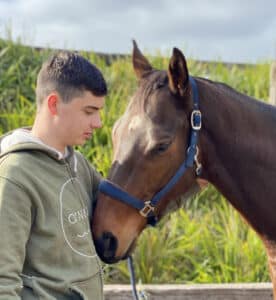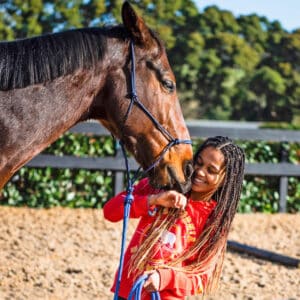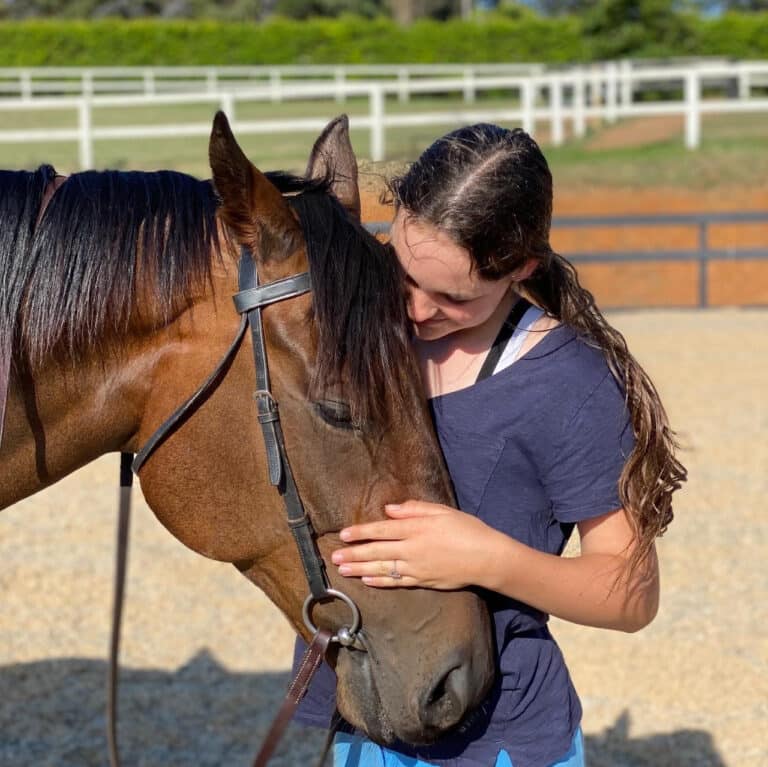Rehab4Rehab helps OTT Thoroughbreds into a useful second career as therapy horses for fragile children. A win-win, writes RACHEL ROAN.
Rehab4Rehab founder Alisha Griffiths has combined her two passions: helping retired racehorses, and supporting struggling children. The in-demand charity offers children equine therapy, including psychology sessions, occupational therapy, and speech pathology support, facilitated by a team of allied health professionals.
Opening in 2020 and based in Victoria, Rehab4Rehab was approved as an essential service during a time of strict COVID lockdowns. “It was pretty scary for people. We mainly marketed on social media and we were absolutely inundated with enquiries.” Alisha tells me. “The lockdowns gave us time to be with the horses 24/7. What we thought was an unlucky time to open, we actually really enjoyed.”
After hitting the ground running, the organisation helped hundreds of kids. “We found many people wanted to use their one hour outdoors to spend time with the horses,” Alisha explains. With mental health a priority, the demand for essential services was enormous, and she found that evidence-based therapies combined with horse therapy produced staggering results. “I firmly believe there’s power in a session in a paddock with a retired racehorse, compared to sitting a child down in a white wall city environment.”
It’s hardly a surprise that many children, already feeling fragile, struggle to engage in a clinical environment, and find connecting with a virtual stranger difficult. But Rehab4Rehab offers a very different scenario. “In our sessions, the child can walk alongside a psychologist, quickly building trust and rapport as they discuss how to be safe around horses,” Alisha says. “There’s something about having a horse to pat while they talk that distracts them from why they’re there, and there’s no expectation of eye contact. Children often report that their visits don’t feel anything like a psychology session.”

The children learn to examine their behaviour and recognise how it makes the horse react.
Rehab4Rehab’s choice of horses is interesting. You’d think older horses would fit the bill, but Alisha chooses the opposite, and for good reason. “Thoroughbreds are brave. They’ve had extensive exposure during their time on the track to things like barriers, trucks, cars, umbrellas, people, dogs, everything. They’ve been humanised since birth, they’ve got a really good work ethic, and all the hard work has been
done,” she adds. She finds each horse is different, and the retraining process cannot be rushed. “Coming off the track, they’re often fed up on high energy diets. They’re athletes used to being in a system, so bringing them back to the farm is a big adjustment. They take time to get used to the change of pace.”
Starting out, Alisha put out a call for retired racehorses and was inundated with offers. While her initial idea was to retrain hundreds of OTTs, that’s been scaled down due to a shortage of allied health professionals, particularly those who are interested in working with horses. There are currently 30 retired racehorses on the property, with six superstar therapy horses.
Most Rehab4Rehab horses are put through a six to eight month retraining program, and Alisha is confident that they can turn any retired racehorse into a therapy horse within that time frame. Newly arrived horses are given a chance to unwind, first spending time stabled so the staff can get to know them and identify their strengths, weaknesses, and quirks. The basic health checks, including scoping for ulcers, are covered before the horses enjoy a stint in the paddock, followed by ridden work a few times a week. Some horses progress quicker than others, but the goal is for them to be calm, and able to be led, brushed and tied up.

Crackajack bestows a horsey kiss.
Rehab4Rehab offers a variety of approaches to therapy, so some horses need only to enjoy being brushed and patted, while others are used to teach children to lunge, or are led through an obstacle course. Those who show potential for a performance career are often retrained and rehomed, but the charity’s aim is not to sell horses. “Our business is equine therapy,” Alisha says, “and that’s made possible by supporters like the Melbourne Racing Club Foundation, which has made a generous donation to our charity to provide funding for underprivileged children and youth to attend our program where they’ll develop skills they’ll use for the rest of their lives.”
In the first session, children meet and greet all the horses, and eventually progress to working with them under close supervision. “The horses are a fabulous tool to teach children self-reflection. They have to examine their behaviour and how it makes the horse react. Kids with anxiety can see how that anxiety impacts the horse,” Alisha explains. “We’ve had non-verbal children speak during their first session. They might not be chatting to the therapist, but they’ll talk to the horse. We’ve seen kids cuddle up to our horses and tell them their secrets. It’s such a powerful tool. After experiencing this, most of our psychologists say they’ll never work in a clinical room with a child ever again.”
And that’s a win-win.
All images courtesy Rehab4Rehab



